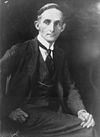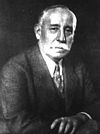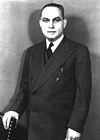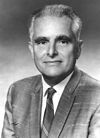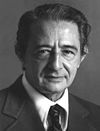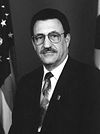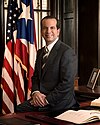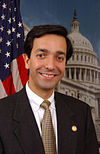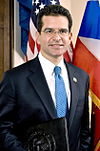| Resident Commissioner of Puerto Rico | |
|---|---|
 | |
| United States House of Representatives | |
| Seat | Puerto Rico |
| Term length | Four years, renewable [1] |
| Formation | January 2, 1900 |
| First holder | Federico Degetau |
| Salary | US$174,000 |
| Website |
gonzalez-colon |
| Puerto Rico's at-large congressional district | |||
|---|---|---|---|
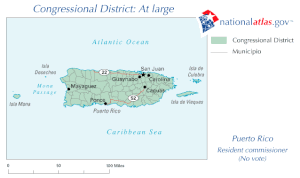 | |||
| Resident Commissioner |
| ||
| Area | 3,515 sq mi (9,100 km2) | ||
| Population (2019) | 3,193,694 | ||
| Median household income | 14,412 | ||
| Ethnicity |
| ||
| Occupation |
| ||
The resident commissioner of Puerto Rico ( Spanish: Comisionado Residente de Puerto Rico) is a non-voting member of the United States House of Representatives elected by the voters of the U.S. Commonwealth of Puerto Rico every four years, [1] the only member of the House of Representatives who serves a four-year term. Because the commissioner represents the entire territory of Puerto Rico irrespective of its population, and is not subject to congressional apportionment like those House members representing the 50 states, Puerto Rico's at-large congressional district is the largest congressional district by population in all of the United States.
Commissioners function in every respect as a member of Congress, including sponsoring legislation and serving on congressional committees, where they can vote on legislation, [2] but they cannot vote on the final disposition of legislation on the House floor. [3] They receive a salary of $174,000 per year [4] and are identified as Member of Congress. [2]
The current commissioner is Jenniffer González-Colón of the New Progressive Party (PNP), the first woman to hold the post. [1] She is also affiliated with the Republican Party (R) at the national level.
Other U.S. territories have a similar representative position called a delegate.
History
The United States Congress had seated non-voting "delegates" from various territories since 1794 as the country expanded across North America; these territories were all eventually admitted as states. The position of delegate was a legislative position with a two-year term, just like a member of Congress. [5]
The United States acquired several overseas possessions as a result of the Spanish–American War. While the House of Representatives voted in 1900 for Puerto Rico to select a delegate, Congress instead devised a new form of territorial representative in the resident commissioner. United States Senator John Coit Spooner argued that granting a territory a delegate implied that it was on the path to statehood, which he asserted was not guaranteed for the new possessions acquired in the war, such as Puerto Rico and the Philippines. [5] In fact, more than a century later, neither has become a state. (Puerto Rico remains a U.S. territory, while the Philippines became an independent republic in 1946.)
The original resident commissioner positions served a two-year term, [6] though it was later extended to four years starting in 1920. [7] [5] [8] The position also had executive responsibility in addition to legislative ones. The term had been used as to parts of the British Empire (see resident commissioner), but in an almost opposite sense; sent or recognized as the Crown's representative to manage a territory. In the American sense, resident commissioner always refers to a representative of a territory to the national government. [5]
This representation has evolved over time. At first, the resident commissioner could not even be present on the floor of the House of Representatives; floor privileges were granted in 1902. [5] In 1904, the officeholder gained the right to speak during debate and serve on the Committee on Insular Affairs, which had responsibility for the territories gained in the Spanish-American War. [5]
In 1933, Resident Commissioner Santiago Iglesias was appointed to additional committees, and each of his successors has served on other committees also. [5] But only in 1970 did the resident commissioner gain the right to vote in committees, gain seniority, or hold leadership positions. [5]
The present-day resident commissioner, like the delegates from other territories and the District of Columbia, has almost all of the rights of other House members, including being able to sponsor bills and offer amendments and motions. [5] Territorial representatives remain unable to vote on matters before the full House.
Summary of commissioners
- 1901–1905: Federico Degetau
- 1905–1911: Tulio Larrínaga
- 1911–1916: Luis Muñoz Rivera
- 1916–1917: vacant
- 1917–1932: Félix Córdova Dávila
- 1932–1932: vacant
- 1932–1933: José Lorenzo Pesquera
- 1933–1939: Santiago Iglesias
- 1939–1939: vacant
- 1939–1945: Bolívar Pagán
- 1945–1946: Jesús T. Piñero
- 1946–1946: vacant
- 1946–1965: Antonio Fernós-Isern
- 1965–1969: Santiago Polanco Abreu
- 1969–1973: Jorge Luis Córdova
- 1973–1977: Jaime Benítez Rexach
- 1977–1985: Baltasar Corrada del Río
- 1985–1992: Jaime Fuster
- 1992–1993: Antonio Colorado
- 1993–2001: Carlos Romero Barceló
- 2001–2005: Aníbal Acevedo Vilá
- 2005–2009: Luis Fortuño
- 2009–2017: Pedro Pierluisi
- 2017–Present: Jenniffer González
List of resident commissioners pre-Constitution of the Commonwealth of Puerto Rico
Resident commissioners under the Constitution of the Commonwealth of Puerto Rico
Popular Democratic Party (6)
New Progressive Party (6)
US Party Affiliation
Democratic Party (10)
Republican Party (2)
Recent elections
2000
| Party | Candidate | Votes | % | |
|---|---|---|---|---|
| Popular Democratic | Aníbal Acevedo Vilá | 983,488 | 49.34 | |
| New Progressive | Carlos Romero Barceló (incumbent) | 905,690 | 45.43 | |
| Independence | Manuel Rodríguez Orellana | 95,067 | 4.77 | |
| Write-in | 9,238 | 0.46 | ||
| Total votes | 1,993,483 | 100.00 | ||
| Popular Democratic gain from New Progressive | ||||
| Democratic hold | ||||
2004
| Party | Candidate | Votes | % | |
|---|---|---|---|---|
| New Progressive | Luis Fortuño | 956,828 | 48.83 | |
| Popular Democratic | Roberto Prats Palerm | 945,691 | 48.26 | |
| Independence | Edwin Irizarry Mora | 56,589 | 2.89 | |
| Write-in | 445 | 0.02 | ||
| Total votes | 1,959,553 | 100.00 | ||
| New Progressive gain from Popular Democratic | ||||
| Republican gain from Democratic | ||||
2008
| Party | Candidate | Votes | % | |
|---|---|---|---|---|
| New Progressive | Pedro Pierluisi | 996,997 | 52.70 | |
| Popular Democratic | Alfredo Salazar | 799,746 | 42.27 | |
| Puerto Ricans for Puerto Rico | Carlos Velazquez | 45,154 | 2.39 | |
| Independence | Jessica Martinez | 37,129 | 1.96 | |
| Write-in | 12,773 | 0.68 | ||
| Total votes | 1,891,799 | 100.00 | ||
| New Progressive hold | ||||
| Democratic gain from Republican | ||||
2012
| Party | Candidate | Votes | % | |
|---|---|---|---|---|
| New Progressive | Pedro Pierluisi (incumbent) | 905,066 | 48.76 | |
| Popular Democratic | Rafael Cox Alomar | 881,181 | 47.47 | |
| Independence | Juan Manuel Mercado | 38,941 | 2.10 | |
| Working People's | Félix Córdova Iturregu | 13,120 | 0.71 | |
| Sovereign Union Movement | María de Lourdes Guzmán | 11,764 | 0.63 | |
| Puerto Ricans for Puerto Rico | Sadiasept Guillont | 5,647 | 0.30 | |
| Write-in | 626 | 0.03 | ||
| Total votes | 1,856,345 | 100.00 | ||
| New Progressive hold | ||||
| Democratic hold | ||||
2016
| Party | Candidate | Votes | % | |
|---|---|---|---|---|
| New Progressive | Jenniffer González | 718,591 | 48.80 | |
| Popular Democratic | Héctor Ferrer | 695,073 | 47.21 | |
| Independence | Hugo Rodriguez | 39,704 | 2.70 | |
| Working People's | Mariana Nogales Molinelli | 19,033 | 1.29 | |
| Total votes | 1,472,401 | 100.00 | ||
| New Progressive hold | ||||
| Republican gain from Democratic | ||||
2020
| Party | Candidate | Votes | % | |
|---|---|---|---|---|
| New Progressive | Jenniffer González (incumbent) | 490,273 | 40.83 | |
| Popular Democratic | Aníbal Acevedo Vilá | 384,619 | 32.03 | |
| Citizens' Victory | Zayira Jordán Conde | 154,751 | 12.89 | |
| Project Dignity | Ada Norah Henriquez | 94,059 | 7.83 | |
| Independence | Luis Piñero González II | 76,398 | 6.36 | |
| Write-in | 788 | 0.07 | ||
| Total votes | 1,200,888 | 100.00 | ||
| New Progressive hold | ||||
| Republican hold | ||||
See also
Notes
- ^ Gonzalez caucuses with the Republican Party.
References
- ^ a b c Wines, Michael (July 26, 2019). "She's Puerto Rico's Only Link to Washington. She Could Be Its Future Governor". The New York Times.
- ^ a b James R. Fuster, Member of Congress from Puerto Rico (August 29, 1990). "Our 51st State?". Newsweek.
- ^ "Commish. Jenniffer González-Colón, Resident Commissioner from Puerto Rico's At-Large District, Republican". govtrack.us. January 3, 2017. Retrieved September 28, 2017.
- ^ Brudnick, Ida A. "Salaries of Members of Congress : Recent actions and Historical Tables". Senate.gov. Retrieved March 3, 2015.
- ^ a b c d e f g h i Rundquist, Paul S. "Resident Commissioner from Puerto Rico". congressionalresearch.com. Retrieved August 3, 2019.
- ^ Pub. L. 56–191, §39 (31 Stat. 86)
- ^ Pub. L. 64–368, §36 (39 Stat. 963)
- ^ "Delegates to the U.S. Congress: History and Current Status".
External links
- 1901 establishments in Puerto Rico
- At-large United States congressional districts
- Congressional districts of Puerto Rico
- Constituencies established in 1901
- Hispanic and Latino American members of the United States Congress
- Lists of political office-holders in Puerto Rico
- Political office-holders in Puerto Rico
- Resident Commissioners of Puerto Rico




